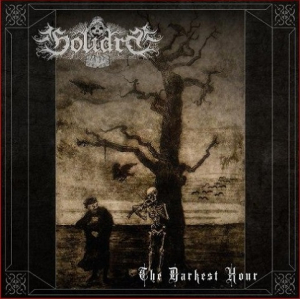
A ‘goliard’ gets often compared to a person who is, or used to be, religious, but who sort of started protesting against the narrow-minded limitations of the church. During the High Middle Ages, goliards were well-educated people, often strongly related to clerical studies, that tried to fight against the hypocrisy of the Roman / Catholic tradition via sarcastic or ironic poetry and chant. It was some kind of anti-clerical protest that penetrated the West-European society almost one thousand years ago.
Thank you for paying attention.
There is another entity called that way, and then I am talking about a band from Medellin, Colombia (known for their white powder sugar, you know) [and just FYI, but there is another interesting band with the ‘goliard’ moniker, from Ukraine, but that is another story]. Goliard were formed a decade ago, but the amount of official releases is quite limited: an EP in 2013 (Cantuus Goliae, digitally self-released) and a full-length in Spring 2017 (Iconoclastic Hymns). That one was released by exactly the very same label that takes care of the release of Goliard’s newest album, their sophomore full-length studio album The Darkest Hour, i.e. The Ritual Productions from The Netherlands. This label has been satisfying my ear-drums and grey cells (all 666 of them) more than once, and I am glad to notice that Jasper plus crew stood behind this release once more.
The Darkest Hour has been printed in an edition of 500 copies with quite a sober eight-page booklet, which includes the English lyrics. It was recorded during Summer and Autumn 2019 by Victor (lead vocals and rhythm guitars), Cristian (lead guitars), Cadaver (drums and percussion) and Ivan (nice name; bass guitars) with assistance of The Ritual Productions and Masacre’s Alvaro Alvarez (Tzelmoth, Erzebet, Death Cult, Casket Grinder, Mysteriis, etc.) for recording, mix and mastering at Nebuloza Producciones.
With inclusion of the intro and outro, The Darkest Hour has a total running time of almost thirty-four minutes. That intro, called I – Exordium, is a heavy and melodic instrumental piece, starting and ending with a melancholic semi-acoustic melody, and mainly based on an atmospheric lead riff, heavily supported by a cohesive rhythm section. It does show a first glimpse of these guys’ professional skills, for this intriguing introduction on the album immediately catches.
(so does the outro, called VIII – Peroratio, without the acoustics, by the way, creating atmosphere and elegance)
What comes next is based on the purity of the old styled tradition of Black Metal, you know, that glorious Second Wave trend that conquered Mater Terra mercilessly so many years ago. What strikes me enormously as from the beginning, is the focus on the guitar play. Goliard’s stuff is built around guitar-led melodies, with several twin and tremolo riffs and scrupulous details and punctual strains in guitar structure. And without falling into exaggeration, there are several well-developed solos too, rooted in areas of thrashing supremacy.
Another thing that strikes me is the presence of the rhythm section. Okay, the sound quality has a lot to do with this. Actually, the production is superb. There is room for rawness, you know, of the grim, nasty kind. Yet at the same time, the equilibrium within the final mix has been worked out carefully and well-balanced. This results in a very audible representation of the supportive instrumentation (bass and rhythm guitars and percussion). The background strings are firm and steady, never fading away into an invisible background at all. I think those non-leading string parts act like a perfected counter-balance to the prolific and prominent leads. And you have the thunderous drum patterns, penetrating the whole with an unstoppable energy, like a fulminating tank, or a bulldozer crashing from a cliff, shattering rock and skull.
The coherence in between all instruments’ play is of a very high level. That’s a good thing, because, let’s be honest, the level of originality is quite minimal. But who cares about that (I do not!)? Goliard do not exist to reinvent the scene. Instead, they rather want to pay tribute to the very core of the scene. Which easily brings me to one thing I did not mention: the vocals. Well, Victor’s timbre of screams is extremely rough and hoarse, spawning acid, spitting blood. That vocal asperity fits to the usurping vigour for sure. But more than once, even though modestly woven into the whole concept, Goliard come up with variations, like whispers, harmony chants, punky yells or spoken words. Here too, there’s no pathetic exaggeration, yet this can rather be seen as an ingenious affix to this sonic adventure. And important to add, but to my opinion the intelligibility of the pronunciation is exceptionally high for a band from Latin America.
What I do appreciate a lot too, is the variation in structure and tempo. The better part is speed-up and kicking, thrashing and blustering, with sudden breaks, frenzy blasts and deadly outbursts. Ninety percent of this album drones, blusters and roars. But a limited yet necessary number of chapters slow down, and these decelerated fragments and pieces create epic and victory on top of the fearless and aggressive lust for battle. An example is the introductive part of Disharmony (which is, by the way, based on a poem by John Keats, dealing with the anxiety of getting older, dealing with transience and death).
The Darkest Hour is not a renewing album, yet still refreshing and, above all, extremely well-written and professionally executed. Fans of straightforward tradition must pay attention!
https://www.facebook.com/GoliardBM
https://www.youtube.com/channel/UCumroDudSkiFtYUEX0BMVvg
